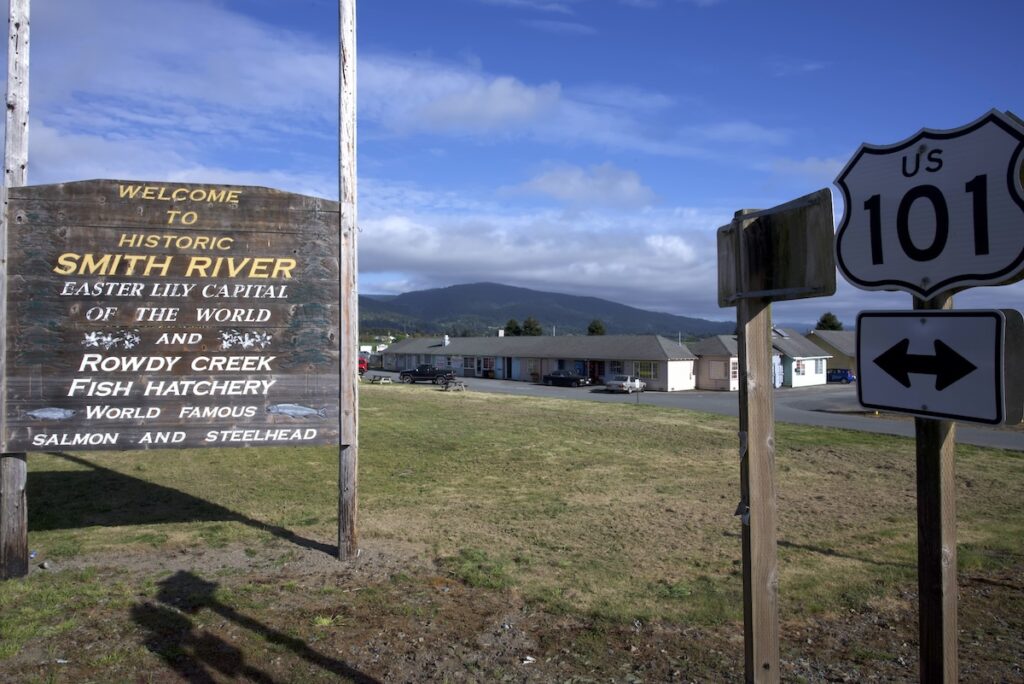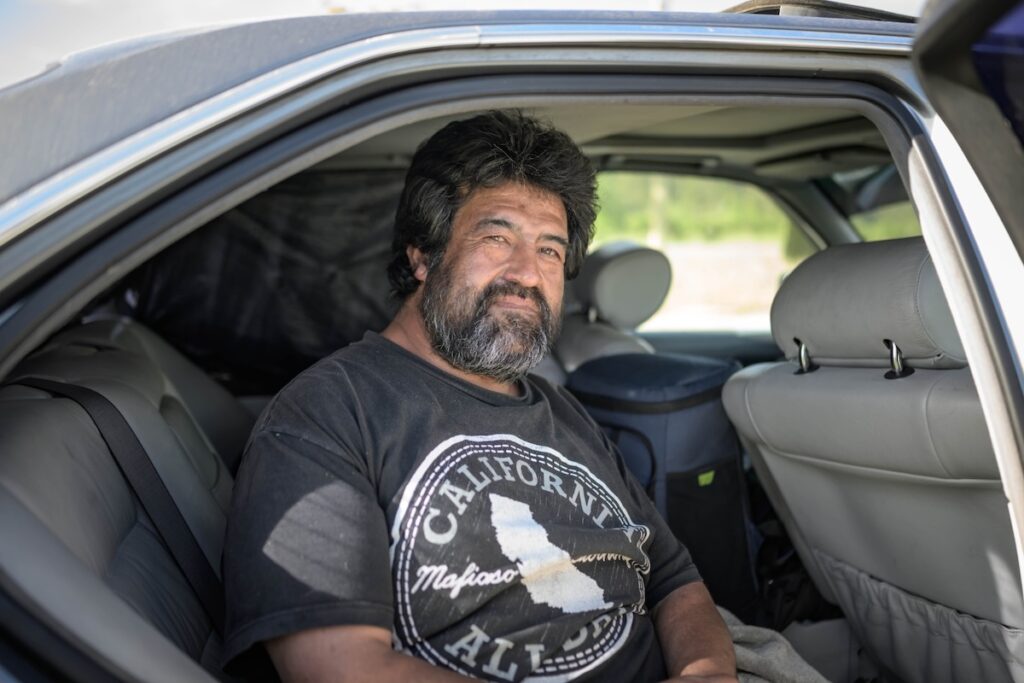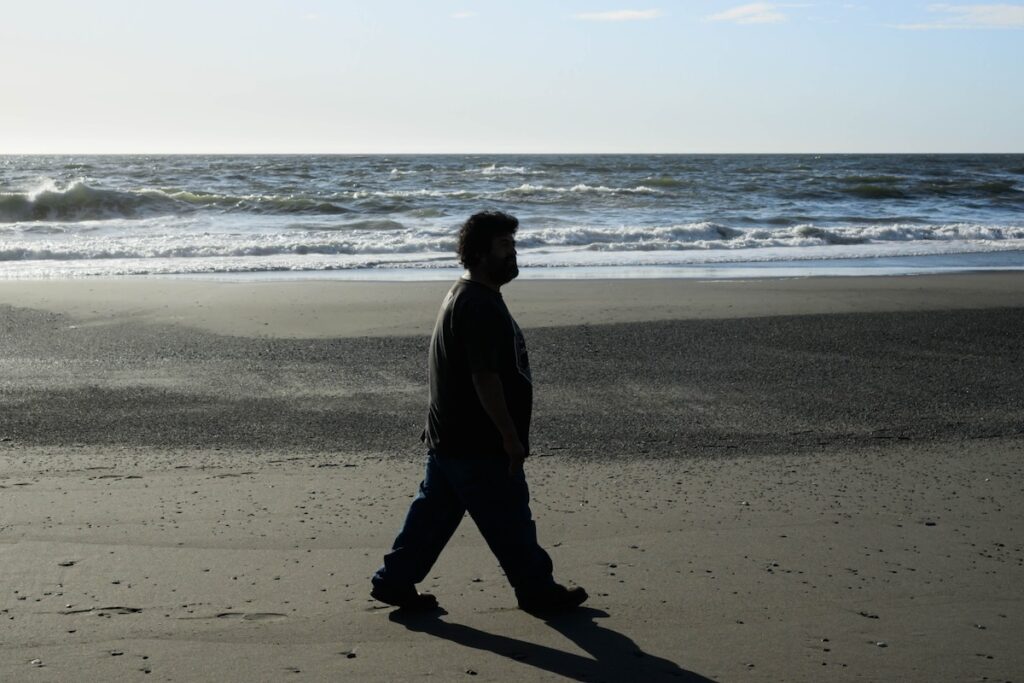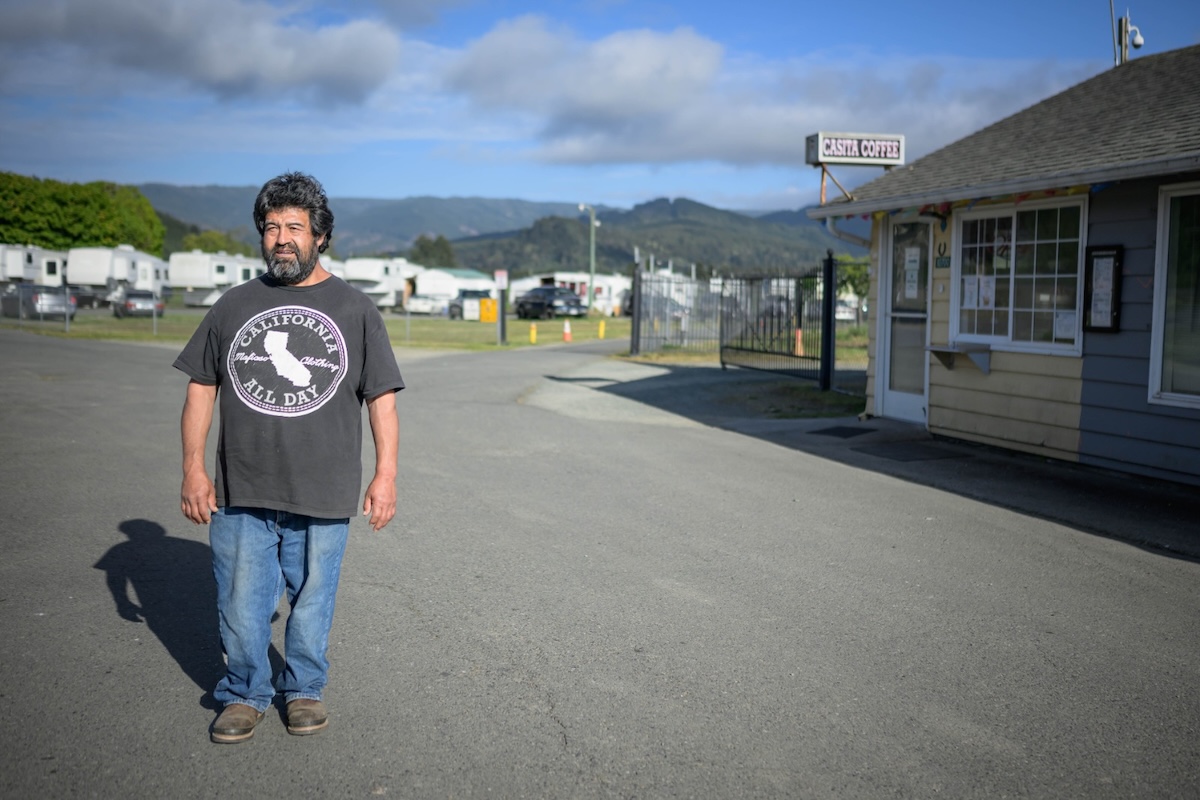Above: Alvaro Urrea Olivares at the entrance to the trailer park where he and some 50 migrant farmworkers live in Smith River, Del Norte County. (Credit: Manuel Ortiz)
SMITH RIVER, Calif. – Alvaro Urrea Olivares is soft-spoken, congenial. At 45, his leathered hands betray decades working the lily fields that are a driver of the local economy in this small community on the extreme northern edge of California.
Smith River is not just rural, locals say, it’s rural remote, California’s last frontier, and it’s here where the state’s plan to extend healthcare to all residents is being tested.
“I don’t have a home. Others help me here. They help me find work; they give me food. I sleep in my car. It’s not as bad as those who sleep outside,” explains Urrea, who goes by the nickname Caballo (Spanish for horse). He points to an abandoned BMW.
Chock full of blankets and personal belongings, the car sits parked amid a row of trailers that house some 50 farmworkers and their families, the overwhelming majority from the states of Veracruz, Jalisco, and – in the case of Urrea – Guanajuato, Mexico. A sign at the park’s entrance declares, “Welcome to Smith River. Easter lily capital of the world.”

In years past migrants – many undocumented – came and went with the lily harvest, returning to Mexico in fall and coming back to Smith River in spring for planting. But as border restrictions tightened many have remained in what has become a permanent community. In between planting and harvesting, residents turn to day jobs to get by.
“It’s expensive here,” Urrea continues in Spanish. “When people don’t have work, they can’t cover the rent. I’ve been sleeping in this car for three years.”
As of January 1, California made Medi-Cal – the state’s version of Medicaid – available to all residents regardless of immigration status. At the same time, it has also dramatically expanded Medi-Cal services to include help with things like nutrition, mental health and housing support, among other needs.
Yet word of the expansion has yet to reach the farmworkers here, many of whom are uninsured and would potentially qualify.
Manuel Ortiz reports on the lack of information around Medi-Cal eligibility available to farmworkers in Smith River, Del Norte County, for the radio program, Por la Libre. (Spanish only. Click here to read a transcript in English.)
‘Don’t get sick here’
“I got pretty sick a few years ago. They didn’t cover my medications,” says Urrea, referring to the clinic where he went for treatment in Crescent City, 15 miles to the south. “These days I don’t have much work and I don’t have money to pay. So, I get pills at the store when I get sick.”
Pills at the store. It’s a phrase you hear from other residents of the trailer camp when asked about their health.
“I don’t know how to get insurance,” says Tino (who declined to provide a last name). In his mid-30s, Tino has lived in one of the trailers here for two years. “I got sick three months ago and I just took some pills.” He adds, “We’re Latinos, immigrants…It’s not easy for us to get insurance.”

Smith River is located on the northwestern edge of Del Norte County, a thinly populated corner of northern California sandwiched between Humboldt County to the south, the Oregon border to the north, sprawling forests eastward and the Pacific to the west. Latinos here make up just 20% of the overall population – which is majority white with a significant Native American presence – though they are the vast majority of the region’s agricultural workforce.
And like many communities here, there is – at least among the farmworkers interviewed for this story – an instinctual distrust of government. Don’t depend on the state. If you get sick, it’s on you. Or, as one resident remarked, “better just don’t get sick here.”
Getting the word out
Kathleen Moreno heads outreach and enrollment for Open Door Community Health Center, which operates 12 clinics across Del Norte and neighboring Humboldt counties.
“There are people who have had no access to health care for as long as they have been here,” she says, “and so some of their health conditions are scary and uncontrolled.”
As a Federally Qualified Health Center (FQHC), Open Door is one of nearly three dozen organizations across 48 of California’s 58 counties that are part of the Navigators Health Enrollment Project, launched by the California Department of Healthcare Services (DHCS) to help get the word out about Medi-Cal eligibility to local communities. The initiative is set to run through mid-2026.
Doing that in places like Del Norte, where distances are long and resources few, is not without its challenges.

“Up here there is no easy channel for communication,” says Moreno, who lives in Crescent City. There are no local Spanish language radio stations, no newspapers, limited internet access in some areas, she noted. “It’s been that way since I’ve lived here for 18 years.”
Open Door relies on informational posts to platforms including Facebook, tabling at local health fairs and community events, and community health workers, also known as Latino Health Coordinators, of which there are two covering Del Norte, and three for all of Humboldt.
Moreno oversees their work. “Their success has been largely based on trust and word of mouth referrals… once a family realizes they can trust our coordinators, then they tell their family.”
But going to the farms directly has been a challenge, Moreno says. “Obviously, we can’t impede work and the farm owners weren’t excited to have people at the farms. So, we posted up in break rooms, brought a healthy snack so everyone would come in and chit chat. But lunch breaks are short – half an hour — and then they are back to work.”
Open Door also scanned patient records from 2022 and 2023 to see who had accessed care previously but didn’t have insurance. These individuals were enrolled in Emergency Medi-Cal and are now eligible for Full scope Medi-Cal under the current expansion, though many may not be aware of this fact, Moreno acknowledges.

Another key barrier is the lack of public transport. The nearest clinic to Smith River is in Crescent City. For serious medical needs, patients must travel as far as Redding, a four-hour drive south, or San Francisco, a six-hour journey.
There is also a lack of providers. “It is really difficult to find providers who want to live and work in Crescent City. Sometimes we find a great provider and they stick around. More often, they move on,” Moreno says, noting there is only one ophthalmologist in Crescent City who takes Medi-Cal patients, and his patient list is maxed out.
Politics adds to the distrust, with undocumented residents having to weigh their health care needs against fear of rousing anti-immigrant sentiment and jeopardizing a path to citizenship or legal residency by accessing public benefits, which under the previous administration could be cause for deportation.
“That is a real thing that people do worry about,” says Moreno. “We heard from one person who said, ‘If my information gets out and I get deported, at least I’ll get access to health care.’”
‘You have to take care of yourself’

Back in Smith River, residents of the trailer park were at turns unaware and uncertain about the current Medi-Cal expansion.
“I’ve never heard of Medi-Cal,” says Alberto Hernandez, originally from Chiapas and a resident here for the past 11 months. Asked what he does when he gets sick, he shrugs. “I don’t know… it’s very expensive here. Maybe go back to Mexico.”
Anancio Hernandez works as a local chef. “One or two months ago, I had some pain. But I kept working, even though I was sick,” he says. “I don’t have insurance, so I didn’t go to the hospital.” Asked about whether he would enroll in Medi-Cal if given the chance, he nodded. “I’ll go look into it to see if there is this opportunity.”
For his part, Urrea shares that his mother, who also lives in Del Norte, was recently hospitalized after suffering a stroke. She lost sight in her left eye, he says. Like him, she is uninsured.
And while his fondness for the community and the region is clear – he is eager to show visitors the local beaches, where he says he sometimes goes to clear his head – he’s clear eyed about the challenges.
“When you’re dying, you have to take care of yourself. That’s the bad thing about here.”
Additional reporting by Manuel Ortiz.
This is the second in a series looking at the expansion of Medi-Cal in California’s rural north. You can read the first part here. This project is a collaboration between EMS and Peninsula 360 Press and was funded by the USC Annenberg Center for Health Journalism’s 2024 California Health Equity Impact Fund.




